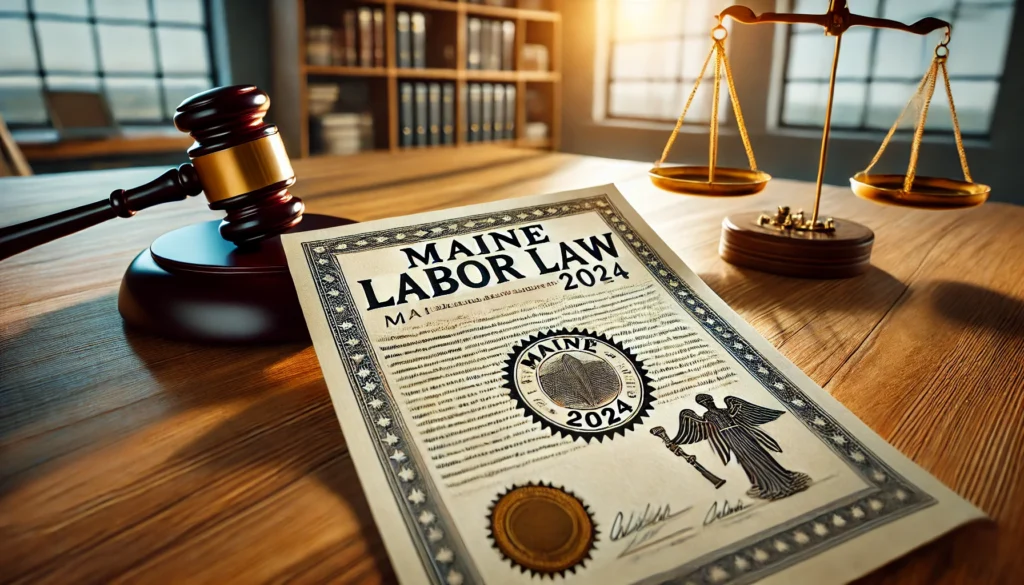Maine Labor Law Explained: What Every Employer Must Know

Maine labor law forms the foundation of workplace regulations in the state, ensuring fair treatment and safety for all employees. Whether you’re an employer or an employee, understanding these laws is crucial. In this article, we will explore the key aspects of Maine labor law, including minimum wage regulations, overtime rules, employee rights, and more. With this comprehensive guide, you’ll be well-prepared to navigate the complexities of labor laws in Maine.
Table of Contents
- Minimum Wage Regulations in Maine
- Overtime Rules and Regulations
- Employee Rights under Maine Labor Law
- Workplace Safety Standards in Maine
- Rest Break Requirements
- Hiring Practices and Termination Policies
- Workers’ Compensation and Benefits
- Anti-Discrimination Laws
- Family Leave Policies in Maine
- Frequently Asked Questions
Minimum Wage Regulations in Maine
First and foremost, Maine labor law establishes the minimum wage regulations that all employers must follow. As of 2024, the minimum wage in Maine is $13.80 per hour. This rate applies to most employees, ensuring fair compensation across various industries. Consequently, employers must adhere strictly to this rate, although there are exceptions for specific worker categories like tipped employees and minors.
Understanding Wage for Tipped Employees
Tipped employees in Maine, for example, may receive a lower hourly wage. However, their total earnings, including tips, must meet or exceed the minimum wage. This ensures that even those in service roles receive fair compensation under Maine labor law.
Annual Adjustments to Minimum Wage
Additionally, Maine labor law mandates an annual adjustment of the minimum wage based on the cost of living. Therefore, employers need to stay updated on these changes to maintain compliance and avoid penalties.
Overtime Rules and Regulations
Another crucial aspect of Maine labor law is the regulation of overtime pay. Non-exempt employees earn overtime pay at a rate of one and a half times their regular hourly wage for any hours worked beyond 40 in a workweek. This rule ensures that extra hours result in extra pay, thus protecting workers from being overworked without proper compensation.
Calculating Overtime Correctly
Employers must accurately calculate overtime pay to avoid significant penalties. They need to track work hours meticulously, as errors can lead to legal issues. Fortunately, tools like Deskcove simplify this process, ensuring compliance with Maine labor law.
Using Deskcove for Time Tracking
Deskcove’s automated tracking and reporting features make it easier for employers to monitor work hours and pay employees correctly. By leveraging such tools, employers can maintain compliance with overtime regulations effortlessly.
Employee Rights under Maine Labor Law
Employee rights, undoubtedly, form the cornerstone of Maine labor law. These laws protect workers from exploitation and ensure fair treatment across various aspects of employment. They cover everything from fair wages to safe working conditions and protection against discrimination.
Right to a Safe Workplace
One of the most vital rights under Maine labor law is the right to a safe workplace. Employers must follow workplace safety standards to ensure that all employees work in environments free from unnecessary risks. Furthermore, this obligation underscores the importance of a healthy work environment for all employees.
Anti-Discrimination Provisions
Moreover, Maine labor law includes strict anti-discrimination provisions. These safeguards protect employees from unfair treatment based on race, gender, religion, age, or other protected characteristics. They apply to all aspects of employment, from hiring to termination, ensuring a fair and inclusive workplace.
Workplace Safety Standards in Maine
Workplace safety, undoubtedly, is a top priority under Maine labor law. Employers must adhere to specific standards that ensure a safe working environment for all employees. This includes providing appropriate training, maintaining equipment, and addressing any hazards that could harm workers.
Role of the Maine Department of Labor
The Maine Department of Labor plays a crucial role in enforcing these standards. Through regular inspections and investigations, the department ensures that workplaces comply with necessary regulations. If employers fail to meet these standards, they face significant penalties, including fines and potential closure.
Employee Rights Regarding Safety
Employees also play a vital role in maintaining workplace safety. They have the right to refuse unsafe work and report violations without fear of retaliation. This collaborative approach between employers and employees creates a safer, healthier work environment for everyone involved.
Rest Break Requirements
Rest breaks are another important aspect of Maine labor law. These breaks ensure that employees have adequate time to rest during their workday. For instance, Maine law entitles employees to a 30-minute unpaid break after six consecutive hours of work.
Meal Break Requirements
This 30-minute break, usually taken for meals, must be uninterrupted. Employers need to ensure that employees can enjoy this time without being required to perform work-related tasks.
Short Rest Breaks
Besides meal breaks, Maine labor law provides for shorter, paid rest breaks throughout the day. These breaks, typically lasting 10-15 minutes, help employees stay refreshed and maintain productivity throughout their shifts.

Hiring Practices and Termination Policies
Hiring practices in Maine, as expected, are governed by laws designed to promote fairness and prevent discrimination. Employers must adhere to anti-discrimination laws during the hiring process to ensure that all candidates are evaluated based on their qualifications and experience.
Ensuring Fair Hiring Practices
To comply with these laws, employers in Maine must follow strict guidelines that prevent discrimination during hiring. These guidelines are crucial for maintaining a diverse and inclusive workplace, as outlined by Maine labor law.
Understanding Termination Policies
Termination policies in Maine, while generally following the “at-will” employment doctrine, do have exceptions. For instance, if a termination violates anti-discrimination laws or other legal protections, it may be considered unlawful. Employers must understand these nuances to avoid potential legal challenges.
Workers’ Compensation and Benefits
Workers’ compensation is a critical component of Maine labor law. It provides benefits to employees who suffer injuries or illnesses as a result of their job. Consequently, most employers must carry workers’ compensation insurance to cover these incidents.
Employer Responsibilities for Workers’ Compensation
Employers must ensure they have the necessary workers’ compensation insurance. Failing to provide this coverage can result in significant penalties, including fines and legal action. They should also familiarize themselves with the process for filing workers’ compensation claims to support employees effectively.
Employee Rights to Workers’ Compensation
Employees injured on the job have the right to seek compensation without delay. They should report injuries promptly and consult with the Maine Department of Labor if they encounter any issues with their claims. This ensures that employees receive the benefits they are entitled to under Maine labor law.
Anti-Discrimination Laws
Anti-discrimination laws are a vital part of Maine labor law. These laws protect employees from unfair treatment based on a wide range of characteristics, including race, gender, religion, and disability. Employers must implement policies that prevent discrimination in the workplace.
Preventing Discrimination in the Workplace
Employers in Maine must take proactive steps to prevent discrimination. This includes training employees, establishing a complaint process, and addressing violations swiftly. By doing so, they create a workplace that is fair and inclusive for all employees.
Employee Rights Under Anti-Discrimination Laws
Employees who experience discrimination have the right to file a complaint with the Maine Human Rights Commission. The commission investigates these complaints and can take legal action against employers who violate anti-discrimination laws. This legal support is crucial in upholding employee rights.
Family Leave Policies in Maine
Family leave policies are another essential aspect of Maine labor law. These policies provide employees with the right to take time off to care for a new child, a sick family member, or their own serious health condition. By understanding these rights, employees can manage their personal and professional lives more effectively.
Maine Family Medical Leave Act (MFMLA)
Under the MFMLA, eligible employees can take up to 10 weeks of unpaid leave within a two-year period. This law allows workers to manage personal or family health issues effectively. Employers must understand their obligations under this act to ensure they provide the necessary leave when required.
Federal Family Medical Leave Act (FMLA)
In addition to state regulations, Maine employers must also comply with the federal Family and Medical Leave Act (FMLA). The FMLA offers similar protections, and employers need to be aware of the requirements under both state and federal laws. This dual compliance ensures that employees’ rights are fully protected under all applicable labor laws.
Frequently Asked Questions
What is the current minimum wage in Maine?
The minimum wage in Maine as of 2024 is $13.80 per hour. This rate applies to most employees, with some exceptions for certain categories such as tipped employees and minors.
How does Maine labor law handle overtime pay?
Non-exempt employees in Maine are entitled to overtime pay at one and a half times their regular wage for hours worked beyond 40 in a workweek. This regulation ensures that employees are fairly compensated for their extra work.
Are rest breaks required under Maine labor law?
Yes, Maine labor law mandates that employees are entitled to a 30-minute unpaid break after six consecutive hours of work. In addition, shorter paid breaks are also required throughout the workday.
What protections does Maine labor law provide against workplace discrimination?
Maine labor law includes strict anti-discrimination provisions, safeguarding employees from unfair treatment based on characteristics such as race, gender, and religion. Employers must implement policies that prevent discrimination and address violations swiftly.
What family leave options are available under Maine labor law?
Under the Maine Family Medical Leave Act (MFMLA), eligible employees can take up to 10 weeks of unpaid leave within a two-year period to care for a new child, a sick family member, or their own serious health condition. Additionally, the federal Family and Medical Leave Act (FMLA) provides similar protections, ensuring comprehensive coverage for employees in need of leave.
